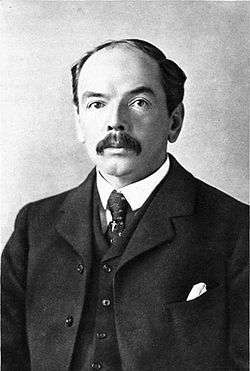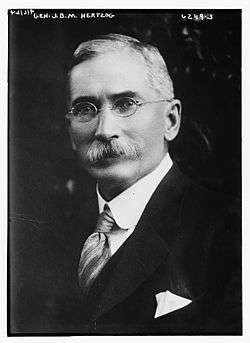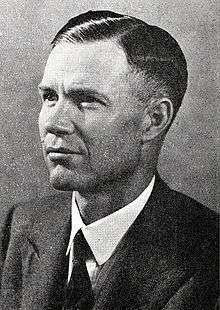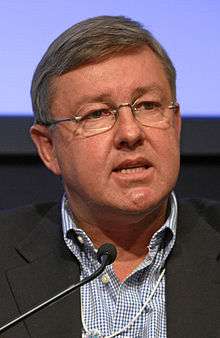Leader of the Opposition (South Africa)
| Leader of the Opposition of the Republic of South Africa
List
| |
|---|---|
| Style | The Right Honourable |
| Term length | While leader of the largest political party not in government |
| Inaugural holder | Leander Starr Jameson |
| Formation | 15 September 1910 |
 |
| This article is part of a series on the politics and government of South Africa |
|
Related topics |
The Leader of the Opposition in South Africa is a title held by the leader of the largest party, not forming part of the government, in the most important house of Parliament. This was the House of Assembly from 1910 to 1994 and the National Assembly from 1994. He or she acts as the public face of the opposition, leading the Official Opposition Shadow Cabinet and the challenge to the government on the floor of Parliament. They thus act as a chief critic of the government and ultimately attempt to portray the opposition as a feasible alternate government.
The current Leader of the Opposition in the National Assembly is Mmusi Maimane of the Democratic Alliance. He is also the national party leader. Former national party leader Helen Zille is not a member of the National Assembly, but is the Premier of the Western Cape.
In the list below, when the office is said to be vacant, there was no opposition party with more than ten seats and no clear Leader of the Opposition has been identified. This was the case between the formation of the Hertzog-Smuts coalition in 1933 and the breakaway of the Purified National Party in 1934. It was also the case during the government of National Unity from 1994 until the National Party ministers resigned in 1996.
In some cases the Leader of the Opposition may have been the Parliamentary leader only, during a vacancy in the party leadership and the first part of their own tenure, before being confirmed as national party leader by a party congress. Only the last two Leaders of the Opposition in the list have been Parliamentary leaders only, whilst the incumbent national party leader was not a Member of Parliament.
Legal definition
Section 56 of the South Africa Act 1909, was amended by Section 1 (b) of the South Africa Act Amendment Act 1946. A salary was provided for the Leader of the Opposition and the office was given an official definition.
"For the purposes of this section the expression 'Leader of the Opposition' shall mean that member of the House of Assembly who is for the time being the Leader in that House of the party in opposition to the Government having the greatest numerical strength in that House and if there is any doubt as to which is or was at any material time the party in opposition to the Government having the greatest numerical strength in that House of Assembly, or as to who is or was at any material time the Leader in the House of such a party, the question shall be decided for the purposes of this section by the Speaker of the House of Assembly, and his decision, certified in writing under his hand, shall be final and conclusive".[1]
The current Constitution of South Africa makes provision for recognition of the Leader of the Opposition in section 57(2):
"The rules and orders of the National Assembly must provide for … the recognition of the leader of the largest opposition party in the Assembly as the Leader of the Opposition."
Rule 21 of the rules of the National Assembly provides in similar words that:
"The leader of the largest opposition party in the Assembly must be recognised as the Leader of the Opposition."[2]
List of Leaders of the Opposition in South Africa (1910–present)
- Notes
- ↑ During this interval, Walter Madeley of the Labour Party served as de facto leader of the opposition, being leader of the largest party outside government coalition.
- ↑ During this interval, Constand Viljoen of the Freedom Front Plus served as de facto leader of the opposition, being leader of the largest party outside government coalition.
References
- The South African Constitution, by H.J. May (3rd edition 1955, Juta & Co)
- Keesing's Contemporary Archives, various volumes
- Smuts: A Reappraisal, by Bernard Friedman (George, Allen & Unwin 1975) ISBN 0-04-920045-3
- South Africa 1982 Official Yearbook of the Republic of South Africa, published by Chris van Rensburg Publications
- ↑ The South African Constitution, pages 596–597
- ↑ "Rules of the National Assembly: 7th Edition" (PDF). Parliament of South Africa. June 2011. Retrieved 25 August 2012.
- ↑ The Times, edition of 24 May 1911, a review of the first session of the Union Parliament. South Africa 1982, Jameson first leader of the Unionist Party in 1910; Unionist Party second largest party in the 1st Union Parliament
- ↑ The Unionists gave some support to the South African Party government, so it could continue in office as a minority government from 1915 to 1920. The Times, article of 21 March 1916 confirms that Smartt was still considered to be the leader of the opposition in the 2nd Parliament of the Union. South Africa 1982, page 166.
.jpg)








.svg.png)








.jpg)